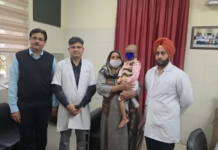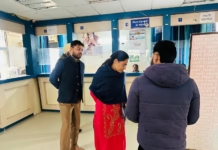Role of radiation therapy in cancer treatment -Dr. Ritu Aggarwal Radiation Oncologist
Rajan / royalpatiala.in/ Ludhiana
The treatment of cancer continues to rest largely on three major modalities: surgery, radiotherapy and systemic therapies, including chemotherapy. To these we can add a number of other approaches: immunotherapy, targeted therapy and gene therapy. The ultimate cancer cure will be possible as a medical action can cause only the malignant cells being targeted to ‘cell kill’ thus protecting the non-malignant cells.
Radiotherapy destroys cancer cells and shrinks tumors by damaging the structure of dividing cells. Cancer cells usually divide faster than normal tissues and are therefore particularly vulnerable to radiotherapy.
Radiotherapy is local, or locoregional, approachto cancer treatment. As long as the cancer is localized to its site of origin or has spread to the regional lymph nodes only, there is a chance of curing the disease using a locoregional approach. Radiotherapy is currently an essential component in the management of cancer patients, either alone or in combination with surgery or chemotherapy, both for treatment and palliation.
More than 50% of all cancer patients can expect to receive radiotherapy during the course of their disease, either in a primary management (radical or adjuvant radiotherapy) or for symptom control (palliative radiotherapy). In addition, an increasing body of evidence now supports the use of high-dose radiotherapy in the treatment of oligometastatic disease where radiation is delivered to a small number of metastases, with studies showing improved local control rates for several tumour sites.
Over the past few decades,technological advancement has provided state-of-the-art instrumentation that enables delivery of radiotherapy with great precision to tumor lesions with substantial reduced injury to normal tissuesthat has revolutionised its clinical use.These state-of-the-art technological advancements,have improved the treatment efficacy of radiotherapy. For example, the overall survival rates of cancer radiation therapy have improved from about 30% two decades ago to about 80% nowadays in some malignancies with minimal side effects and improved quality of life.
New ways of delivering radiation therapy are making it secure andeffective. Some of these methods like 3DCRT, IMRT, IGRT ,SRT ,SRS ,PROTON BEAM are already being used, while others need more study before they can be approved for widespread use.We manage to produce individualised radiation therapy with better target delineation, avoidance of normal tissue, dose escalation, dose fractionation and better prediction of treatment response.
This has given radiation an even greater role in cancer treatment. And scientists around the world continue to look for better and different ways to use radiation to treat cancer potentially resulting in improved outcomes.
About American Oncology Institute
American Oncology Institute is the leading cancer care provider across South Asia operating a chain of cancer hospitals in multiple cities across South Asia. AOI today is a wholly owned subsidiary of Varian Medical Systems (NYSE: VAR).
The team of clinical, paraclinical and healthcare operations experts pride themselves with the aim of closing the gap between standards of cancer care in South Asia and the developed cancer hospitals in the West. AOI provides comprehensive cancer management that is powered by clinical excellence, world class technology as well as best in class clinical pathways and protocols for treatment planning and execution, providing best in-class quality in cancer care across South Asia.
July,4,2020












